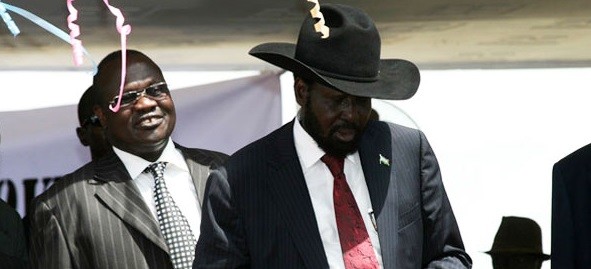South Sudan’s Riek Machar, who served from 2005 to 2013 as vice president, has arrived to the capital Juba today on a flight from Gambella, Ethiopia, more than two years after he fled the city and started the rebel group SPLM-in-Opposition, which sought to overthrow President Salva Kiir and place Machar in the presidency.
The returning politician is due to take up his old post of vice president in accordance with a power-sharing deal with Kiir signed last August.
Machar is a divisive figure in South Sudan who failed to unite the opposition after the outbreak of civil war. A prominent group of SPLM dissidents, known as the ‘Group of Ten’ or ‘Former Detainees’, declined to join his rebellion and instead negotiated as a separate party during peace talks.
His forces still control parts of the territory of his native Nuer tribe and have also claimed the loyalty of a number of armed groups in the Equatoria and Bahr el Ghazal regions of the country. But in more than a year and a half of fighting, Machar failed to secure his stated objective of overthrowing President Salva Kiir.
Machar’s arrival to Juba today marks a return to the city where the civil war began in December 2013, initially as a fight between Dinka and Nuer soldiers of the presidential guards in a barracks in Juba. Fighting in Juba in the first fateful days of the war quickly turned into an ‘organized’ effort to kill citizens belonging to Machar’s Nuer ethnic group, according to multiple human rights inquiries including a report by the African Union.
Riek Machar fled the city at this time. His house was shelled and his bodyguards were killed. In the following months, he oversaw a rebellion that initially took control over parts of Upper Nile, Jonglei and Unity states. His forces also stand accused of perpetrating ethnic killings in Malakal, Bor, Bentiu and elsewhere in a back-and-forth struggle for control and revenge.
As war leader, Machar spent his days mostly between his headquarters Pagak, Addis Ababa, Nairobi and Arusha where negotiations took place, and in other foreign capitals where he traveled in search of arms in support for his rebellion.
Machar’s return to Juba has been encouraged by the guarantors of the August 2015 peace deal, which include Kenya, Uganda, Ethiopia and several Western countries. Last week the countries supporting the peace deal lamented delays caused by disputes over how many weapons and bodyguards Machar could bring with him to Juba.
Following the arrival of Machar today, South Sudan’s president is expected to form a ‘transitional government of national unity’ that will include his own loyalists as well as members of Machar’s SPLM-IO, the SPLM Former Detainees, and other political parties. Kiir’s current vice president James Wani will remain in his position while Machar will take the title ‘First Vice President’, the more senior of Kiir’s two deputies – an arrangement similar to Sudan, where there are two vice presidents.
It is not yet clear, however, when exactly President Kiir will announce his new cabinet.
Upon arrival, Machar was seen wearing an African patterned shirt, greeting the reception committee, and accompanied by his wife and officials of his party.
Minister of Information Michael Makuei, Minister of Finance David Deng Athorbei, the SPLM-IO Advance Team, JMEC Chairman Festus Mogae, members of the diplomatic corps and the Special Representative of the UN Secretary-General were among the dignitaries to receive Machar at the Juba International Airport today upon his arrival on a United Nations flight at about 3:45 p.m.
Also present were Presidential Guard Commander Marial Chanuong, SPLM Chief Whip Tulio Odongi, NSS Director for External Security Thomas Duoth, Akol Paul, and the Inspector-General of Police.
In remarks to press at the airport upon arrival, Machar said in part, “It is important to start thinking how we should kick off national reconciliation and healing in our country. The war was vicious, we have lost a lot of people in it, and we need to bring our people together so that they can unite, reconcile, and heal the wounds – the mental wounds – that they have.”
“Obviously, I am not making a new program – our program is the agreement… as long as there is political will we can overcome all these challenges and all these obstacles, including the heat we are in today, because the room is so hot. So I am happy to be back, and I want to thank the government committee – I have heard of the work they have done, from the very start when the Advance Team came in. I want to thank this committee,” said Machar.
He added, “I want to thank the government in totality for responding to the implementation of the agreement. Today is the eighth month since the agreement was signed in Juba. This is eight months after signature of the agreement – there has been delays, not only on the SPLM-IO coming to Juba, but in totality, there has been challenges.”
Machar also asked for money from supporters of the peace agreement to “resource” the implementation of the peace agreement. He said that national financial resources that had been used for the “war effort” should now be moved to stablization of security, stabilization of the economy and national reconciliation.
Minister of Finance David Deng Athorbei, head of the reception committee, said he would take Machar to J1 where the swearing-in a first vice president would take place. Athorbei said Machar’s coming represented “the last nail in the coffin of the war in the country.”
File photo
More coverage to follow
Additional background information for interested readers:
Has Juba been demilitarized? A guide for confused observers (23 April 2016)
South Sudan’s new peace deal in brief (26 Aug. 2015)
Kiir signs IGAD deal while voicing doubts (26 Aug. 2015)




